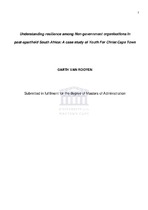Understanding resilience among non-government organisations in post-apartheid South Africa: a case study of Youth For Christ Cape Town
Abstract
Many Civil Society Organisations (CSOs) in South Africa are currently under pressure or threat of closure. Although there have been advances in civil society-state relations after the transition from apartheid to democracy, there has also been a steady decline in the number of CSOs in South Africa since 1994. The reasons for this decline are complex and varied. Given the value CSOs make in contributing to a lively democracy, it is important to explore the factors which
enhance or undermine resilience in such organisations. This study focuses on understanding resilience among Non-government organisations (as an example of a CSO) in post-apartheid South Africa using Youth For Christ Cape Town as a case
study. The site for this study was chosen as YFC Cape Town is arguably one of South Africa's oldest NGOs being formed in 1948. This study aims to, therefore, establish how CSOs in South Africa can ensure resilience and longevity in a complex and evolving political environment by drawing lessons from the selected case study. The elements which have emerged as being important to resilience are (1) Funding; (2) Technical skills; (3) Accessing networks; (4) Adaptation; (5) Core values; (6) Innovation; (7) Leadership. The study found that these factors should not be viewed as isolated elements but rather be seen as integrated developmental framework for ensuring resilience. Another key finding is located around organisational identity. Although adaptation in terms of how the organisation functions are necessary to navigate shifts in the environment, the identity of the
organisation should remain the same. Organisations who change their identity amidst shocks and changes within the system are not very resilient while those who don't are.

